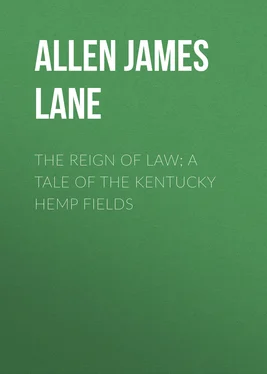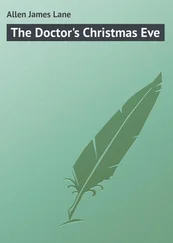James Allen - The Reign of Law; a tale of the Kentucky hemp fields
Здесь есть возможность читать онлайн «James Allen - The Reign of Law; a tale of the Kentucky hemp fields» — ознакомительный отрывок электронной книги совершенно бесплатно, а после прочтения отрывка купить полную версию. В некоторых случаях можно слушать аудио, скачать через торрент в формате fb2 и присутствует краткое содержание. Жанр: foreign_prose, foreign_antique, на английском языке. Описание произведения, (предисловие) а так же отзывы посетителей доступны на портале библиотеки ЛибКат.
- Название:The Reign of Law; a tale of the Kentucky hemp fields
- Автор:
- Жанр:
- Год:неизвестен
- ISBN:нет данных
- Рейтинг книги:5 / 5. Голосов: 1
-
Избранное:Добавить в избранное
- Отзывы:
-
Ваша оценка:
- 100
- 1
- 2
- 3
- 4
- 5
The Reign of Law; a tale of the Kentucky hemp fields: краткое содержание, описание и аннотация
Предлагаем к чтению аннотацию, описание, краткое содержание или предисловие (зависит от того, что написал сам автор книги «The Reign of Law; a tale of the Kentucky hemp fields»). Если вы не нашли необходимую информацию о книге — напишите в комментариях, мы постараемся отыскать её.
The Reign of Law; a tale of the Kentucky hemp fields — читать онлайн ознакомительный отрывок
Ниже представлен текст книги, разбитый по страницам. Система сохранения места последней прочитанной страницы, позволяет с удобством читать онлайн бесплатно книгу «The Reign of Law; a tale of the Kentucky hemp fields», без необходимости каждый раз заново искать на чём Вы остановились. Поставьте закладку, и сможете в любой момент перейти на страницу, на которой закончили чтение.
Интервал:
Закладка:
James Lane Allen
The Reign of Law; a tale of the Kentucky hemp fields
HEMP
The Anglo-Saxon farmers had scarce conquered foothold, stronghold, freehold in the Western wilderness before they became sowers of hemp—with remembrance of Virginia, with remembrance of dear ancestral Britain. Away back in the days when they lived with wife, child, flock in frontier wooden fortresses and hardly ventured forth for water, salt, game, tillage—in the very summer of that wild daylight ride of Tomlinson and Bell, by comparison with which, my children, the midnight ride of Paul Revere, was as tame as the pitching of a rocking-horse in a boy's nursery—on that history-making twelfth of August, of the year 1782, when these two backwoods riflemen, during that same Revolution the Kentuckians then fighting a branch of that same British army, rushed out of Bryan's Station for the rousing of the settlements and the saving of the West—hemp was growing tall and thick near the walls of the fort.
Hemp in Kentucky in 1782—early landmark in the history of the soil, of the people. Cultivated first for the needs of cabin and clearing solely; for twine and rope, towel and table, sheet and shirt. By and by not for cabin and clearing only; not for tow-homespun, fur-clad Kentucky alone. To the north had begun the building of ships, American ships for American commerce, for American arms, for a nation which Nature had herself created and had distinguished as a sea-faring race. To the south had begun the raising of cotton. As the great period of shipbuilding went on—greatest during the twenty years or more ending in 1860; as the great period of cotton-raising and cotton-baling went on—never so great before as that in that same year—the two parts of the nation looked equally to the one border plateau lying between them, to several counties of Kentucky, for most of the nation's hemp. It was in those days of the North that the CONSTITUTION was rigged with Russian hemp on one side, with American hemp on the other, for a patriotic test of the superiority of home-grown, home-prepared fibre; and thanks to the latter, before those days ended with the outbreak of the Civil War, the country had become second to Great Britain alone in her ocean craft, and but little behind that mistress of the seas. So that in response to this double demand for hemp on the American ship and hemp on the southern plantation, at the close of that period of national history on land and sea, from those few counties of Kentucky, in the year 1859, were taken well-nigh forty thousand tons of the well-cleaned bast.
What history it wrought in those years, directly for the republic, indirectly for the world! What ineffaceable marks it left on Kentucky itself, land, land-owners! To make way for it, a forest the like of which no human eye will ever see again was felled; and with the forest went its pastures, its waters. The roads of Kentucky, those long limestone turnpikes connecting the towns and villages with the farms—they were early made necessary by the hauling of the hemp. For the sake of it slaves were perpetually being trained, hired, bartered; lands perpetually rented and sold; fortunes made or lost. The advancing price of farms, the westward movement of poor families and consequent dispersion of the Kentuckians over cheaper territory, whither they carried the same passion for the cultivation of the same plant,—thus making Missouri the second hemp-producing state in the Union,—the regulation of the hours in the Kentucky cabin, in the house, at the rope-walk, in the factory,—what phase of life went unaffected by the pursuit and fascination of it. Thought, care, hope of the farmer oftentimes throughout the entire year! Upon it depending, it may be, the college of his son, the accomplishments of his daughter, the luxuries of his wife, the house he would build, the stock he could own. His own pleasures also: his deer hunting in the South, his fox hunting at home, his fishing on the great lakes, his excursions on the old floating palaces of the Mississippi down to New Orleans—all these depending in large measure upon his hemp, that thickest gold-dust of his golden acres.
With the Civil War began the long decline, lasting still. The record stands that throughout the one hundred and twenty-five odd years elapsing from the entrance of the Anglo-Saxon farmers into the wilderness down to the present time, a few counties of Kentucky have furnished army and navy, the entire country, with all but a small part of the native hemp consumed. Little comparatively is cultivated in Kentucky now. The traveller may still see it here and there, crowning those ever-renewing, self-renewing inexhaustible fields. But the time cannot be far distant when the industry there will have become extinct. Its place in the nation's markets will be still further taken by metals, by other fibres, by finer varieties of the same fibre, by the same variety cultivated in soils less valuable. The history of it in Kentucky will be ended, and, being ended, lost.
Some morning when the roar of March winds is no more heard in the tossing woods, but along still brown boughs a faint, veil-like greenness runs; when every spring, welling out of the soaked earth, trickles through banks of sod unbarred by ice; before a bee is abroad under the calling sky; before the red of apple-buds becomes a sign in the low orchards, or the high song of the thrush is pouring forth far away at wet pale-green sunsets, the sower, the earliest sower of the hemp, goes forth into the fields.
Warm they must be, soft and warm, those fields, its chosen birthplace. Up-turned by the plough, crossed and recrossed by the harrow, clodless, levelled, deep, fine, fertile—some extinct river-bottom, some valley threaded by streams, some table-land of mild rays, moist airs, alluvial or limestone soils—such is the favorite cradle of the hemp in Nature. Back and forth with measured tread, with measured distance, broadcast the sower sows, scattering with plenteous hand those small oval-shaped fruits, gray-green, black-striped, heavily packed with living marrow.
Lightly covered over by drag or harrow, under the rolled earth now they lie, those mighty, those inert seeds. Down into the darkness about them the sun rays penetrate day by day, stroking them with the brushes of light, prodding them with spears of flame. Drops of nightly dews, drops from the coursing clouds, trickle down to them, moistening the dryness, closing up the little hollows of the ground, drawing the particles of maternal earth more closely. Suddenly—as an insect that has been feigning death cautiously unrolls itself and starts into action—in each seed the great miracle of life begins. Each awakens as from a sleep, as from pretended death. It starts, it moves, it bursts its ashen woody shell, it takes two opposite courses, the white, fibril-tapered root hurrying away from the sun; the tiny stem, bearing its lance-like leaves, ascending graceful, brave like a palm.
Some morning, not many days later, the farmer, walking out into his barn lot and casting a look in the direction of his field, sees—or does he not see?—the surface of it less dark. What is that uncertain flush low on the ground, that irresistible rush of multitudinous green? A fortnight, and the field is brown no longer. Overflowing it, burying it out of sight, is the shallow tidal sea of the hemp, ever rippling. Green are the woods now with their varied greenness. Green are the pastures. Green here and there are the fields: with the bluish green of young oats and wheat; with the gray green of young barley and rye: with orderly dots of dull dark green in vast array—the hills of Indian maize. But as the eye sweeps the whole landscape undulating far and near, from the hues of tree, pasture, and corn of every kind, it turns to the color of the hemp. With that in view, all other shades in nature seem dead and count for nothing. Far reflected, conspicuous, brilliant, strange; masses of living emerald, saturated with blazing sunlight.
Читать дальшеИнтервал:
Закладка:
Похожие книги на «The Reign of Law; a tale of the Kentucky hemp fields»
Представляем Вашему вниманию похожие книги на «The Reign of Law; a tale of the Kentucky hemp fields» списком для выбора. Мы отобрали схожую по названию и смыслу литературу в надежде предоставить читателям больше вариантов отыскать новые, интересные, ещё непрочитанные произведения.
Обсуждение, отзывы о книге «The Reign of Law; a tale of the Kentucky hemp fields» и просто собственные мнения читателей. Оставьте ваши комментарии, напишите, что Вы думаете о произведении, его смысле или главных героях. Укажите что конкретно понравилось, а что нет, и почему Вы так считаете.












